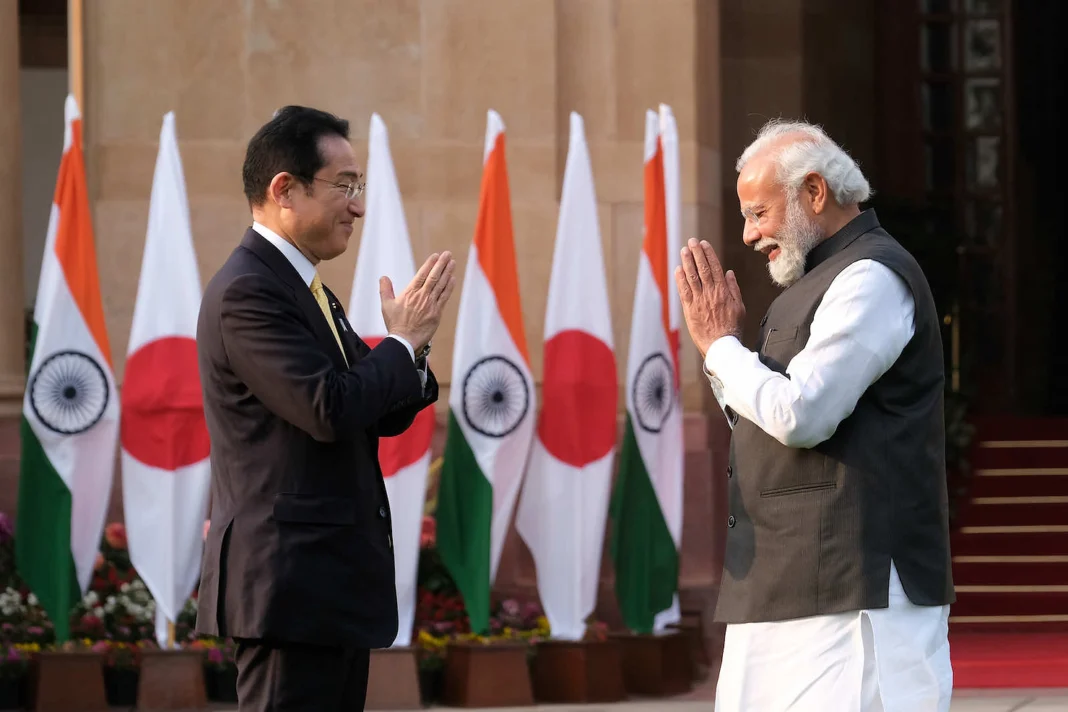Japanese Prime Minister Fumio Kishida with his Indian counterpart Narendra Modi.
The COVID-19 pandemic has severely impacted the economies and global supply chains in the world, Japan’s economy has also been significantly impacted by the pandemic, suffering great damage. In 2020, Japan’s GDP fell by 4.7 percent. The pandemic also led to a decrease in foreign trade. As the pandemic affected the supply chain between Japan and China, Japanese industries were all set to relocate their facilities and supply chains out of China. As a result of the lockdown, the factories in China were shut down, disrupting Japanese supply lines and causing a 50 percent decline in exports to Japan. This prompted the Japanese government to reconsider its dependency and reliance on China.
With this the Japanese government released a relief economic package. The Japanese government had set aside $2 billion in incentives for businesses relocating their production back to Japan and $200 million for firms looking to move their production to other countries. By providing these incentives for Japanese manufacturing industries to leave China, Japan was attempting to lower the economic risks connected with China.
China is Japan’s largest trading partner and for years, Japan has been dependent on China. Since the early 2000s, Japanese officials have been concerned about Japan’s reliance on China as a production base. However, the pandemic changed things. The pandemic led to the closing of many Japanese businesses in China and severely impacted the supply chains. This led Japanese businesses to lessen their reliance on China. The Japanese government emphasized the need to invest and produce, to diversify across Southeast Asia. According to a survey conducted by Tokyo Shoko Research Ltd., 37 percent of the 2,600 participants said the pandemic had forced them to diversify their purchasing outside of China. Japanese Minister for Economy, Trade, and Industry Yasutoshi Nishimura said in a statement, “We have become dependent on China… We need to make supply chains more robust and diverse, broadening our supply sources and increasing domestic production.”
Another reason for diversification is the trade war between China and the United States. The trade war has had a significant impact on businesses in Japan. Japan is one of the most important trading partners for the United States and China. The repercussions of the trade war are being felt by Japan’s business as the United States imposed heavy tariffs and barriers on China.
The need for diversification is not a new phenomenon. Japanese officials and businessmen have been using the China+1 strategy since 2008. China+1 strategy encourages enterprises to expand their operations outside China. It is a business strategy to avoid investing in China and it emphasizes the need to diversify. For many years, countries have made significant investments in China, drawn by the country’s low labor and manufacturing costs as well as the enormous and expanding local consumer market.
On the other hand, India’s economy has been on a rise, it is the fastest growing economy in the world. India has emerged as one of the leading nations in terms of Gross Domestic Product growth rate. Indian markets have tremendous potential for Japanese businesses in terms of business prospects and investments. According to surveys done by the Japan External Trade Organization (JETRO) and Japan Bank for International Cooperation (JBIC), India is the second-most attractive foreign market for Japanese business circles behind China. Japanese businesses have a high potential in India, where they have long dominated the industry with the huge presence of Japanese companies like Suzuki, Honda, Sony, and Panasonic present in India.
India’s enormous and expanding market, as well as its resources, are among the factors contributing to Japan’s growing interest in India. At the same time, India’s information technology sector has caught Japan’s attention. Japan needs engineering talent and India can be of enormous help in this sector as there are many highly qualified technologists in India.
India has emerged as one of the most desirable places to conduct business and invest. The World Bank’s Ease of Doing Business Ranking 2020 shows that India has improved, from rank 142 in 2014 to rank 63.
Japan is the fifth-largest investor in the Indian economy and has been actively investing in India. By 2020, Japan wants to increase infrastructure orders by threefold, reaching around $300 billion. At present, there are over 1455 Japanese businesses in India. India represents an appealing market prospect for Japan. Almost half of its population is under the age of 25, and approximately 200 million people are likely to enter the labor force during the next decade creating a huge opportunity for investors in Japan.
All $ = USD
globalorder.live

